How Big Is the Gap Between the Law Firm under Corporatization (Corporate System) and Traditional Commission Law Firms? | Basic Interpretation of the Corporatization (Corporate System) of Law Firms (VI)
Source: DOCVIT Law Firm Time: 2016-07-01 11:24:10 Author: LIU Guangchao
Recently, most people have asked the same question while discussing the law firm management mode with their peers: What is the difference between the law firms under corporate system and traditional commission law firms on earth? We thought that they were two distinct mechanisms. We also thought that it was a topic that does not need to be discussed. However, after careful thinking, we suddenly found that we got involved in some misunderstandings at the beginning and that it was not so easy to answer this question.
I. What is the essential difference between the law firms under corporatization (corporate system) and traditional commission law firms?
Before discussing this question, we shall clarify a concept, namely: The law firms under corporate system and the commission law firms are not the completely equivalent concepts. First, the corporate system is a concept from the perspective of the overall mechanism of the law firm but the commission system is a concept mainly from the perspective of the distribution mechanism of the law firm; thus, they have different connotations and extensions; Then, the corporate system emphasizes a kind of direction and idea, which is slightly broad, but the commission system represents a kind of practice and system, which is slightly narrow; Finally, the corporate system contains a system and targets all kinds of people of the law firm but the commission system mainly targets the lawyers and especially the partners.
However, the people have been used to treating these two kinds of law firms in this way: Most law firms under corporate system adopt the point-counting system, without commission lawyers, and such law firms adopt the salary system for the lawyers, share the costs and have the public teams The traditional commission law firms certainly adopt the commission system. Most partners get the commission, and most lawyers do not have the basic pay. Such law firms mostly adopt the cost sharing system and basically have no public team. Slowly, the people have equated the corporate system and the point-counting system and have also made the corporate system and the commission system opposed. We discuss it in this way tentatively.
What is the substantial difference between them on earth behind these representations? In fact, just as mentioned above, the law firms under corporate system are integration and corporatization of the law firms in essence; the opposite are non-integration and non-corporatization of the law firms. Therefore, if the traditional commission law firms are used as law firms of the opposite mode and characteristics, it is not difficult to see that the essential difference between them is the integration and corporatization of the law firms. They supplement each other. Integration is the foundation, and corporatization is the essence. Corporatization will be impossible without integration, and integration will be weakened without corporatization.
From the perspective of integration, we shall mainly master five aspects, namely, are the resources integrated? Is the market integrated? Is the management integrated? Is the team integrated? Is the distribution integrated? It seems that distribution integration is very important but in fact, the market integration and team integration are more important, and the resource integration and management integration protect them. It is a simple truth that it is important to emphasize the gathering of “money” but it is more important to pay attention to the gathering of “things”, gathering of “people” and especially gathering of “hearts”. We must come out from the misunderstanding that “the point-counting system is the real corporate system”. In the final analysis, the essence of integration is the real human integration. If the partners have inconsistent ideas, even the thorough point-counting system will be useless!
From the perspective of corporatization, we find that many law firms have also implemented integration but still cannot develop or cannot develop quickly and that even among the integrated law firms, some of them have become a law firm of one person as their scale has shrunk, and some of them have become the parent-system law firms due to the management dissimilation and some of them have become the chicken rib-type law firms as their quality has been reduced. As for the reason, it is more or less because these integrated law firms have not been corporatized. Corporatization emphasizes strategic positioning, product research & development, manpower development, brand management, marketing and cost control. Among them, product research & development, manpower development and brand management are the most critical. In fact, it is enough to see whether such three aspects have been implemented in place to judge whether a law firm adopts the corporate system.
II. How do the traditional commission law firms conduct the corporatization (corporate system) transformation?
Some traditional commission law firms have also gradually acknowledged the advantages of the law firms under corporate system and have wanted to conduct transformation. However, many people always worry that they cannot conduct such transformation or cannot conduct good transformation, so they flinch or hesitate. Is there any solution to this problem? I dare not draw a conclusion arbitrarily but still want to attempt facing this problem. Let me talk about my shallow opinion first.
To transform the traditional commission law firms into the law firms under corporate system, the greatest problem is determination instead of method. To transform the commission system into the corporate system, the law firms are disrupting themselves and will face risks, and it is impossible for them to speak with one voice. In case of slight hesitation, slight doubt or slight repetition, they will pass by the board thoroughly and even be worse than what they were before the transformation. Whether a group of partners figure out and want to conduct transformation or a core partner determines to conduct transformation, they must insist and shall endure the loneliness, withstand torture and endure the loss. During the transformation, it is normal for them to lose business, partners or teams. Many people are not willing to give up the immediate and realistic benefits for the long-term possible benefits even if they understand it. So in this game, the determination of the leader seems especially important.
However, it takes more than determination to transform the traditional law firm under commission system to the law firm under corporate system successfully. There are two factors that determine whether such transformation will succeed or fail: first, whether the law firms have a batch of core partners who have the completely similar ideas; Second, whether such partners have the advantageous business or brand business of the certain quality and quantity. Neither is dispensable. Different from new establishment, transformation must have the foundation. The foundation is people and business. In terms of people, there must be a core circle; in terms of business, there must be the existence guarantee. We must first prejudge whether such two premises have been met before deciding to start the transformation of corporate system.
Only the method is left after such problems are solved. The core and essence of the corporate system are the same although the pattern of manifestation is different. There may be more methods as long as we find the correct direction. After considering carefully, we find that there is nothing more than three methods. First, the practice of “one-size-fits-all approach”, which is to directly transit to the corporate system directly, fully and thoroughly from the commission system, without any intermediate state; Second, the “gradual” practice, which is to adjust the degree of integration and the strength of corporatization step by step and set up a certain term to complete the transformation; Third, the practice of “two systems in one firm”, which is to transform a part into the corporate company but still retain the commission system in a part and then to implement the transformation of the party of commission system to the corporate system under the possible conditions. Among such three methods, the third method is the most dangerous. If the reformers do not have the super ruling ability, the integration of law firms will go beyond all recognition very soon due to the coexistence of two systems, and the corporatization will be more fragmented; thus, we do not suggest that it should be adopted easily. Without the absolute disadvantages, the first and second methods shall be determined according to the personnel characteristics, the unified degree of the core circle and the guarantee degree of basic business of the law firms. Finally, I want to emphasize several principles for transforming the commission system into the corporate system: first, it is more important to transform the thought than the mechanism, and it will be the most painful if the thought still stays in the kingdom of commission after the system is learnt; Second, it is more important to wave the people than to transform the people; never expect to maintain or expand the scale by persuasion and even self-deception; “people who walk different paths cannot make plans together”, so it is more rational to give up some people who disagree and are not firm than to transform them; Third, it is more important to create corporatization than to create integration; with the same people, the same things and the same management and operation methods, it will not make any sense even if they are completely integrated.
III. Can the corporatization (corporate system) be integrated with the traditional commission system in the law firms?
It seems that the law firm under corporate system are so different from the law firms under commission system and there is no possibility of reconciliation and even integration of them. It is also right essentially. The extreme corporate system and the extreme commission system represent two extremes of the integration and marketization. Reconciliation means moderation and discount and even the destruction of the essence of things. Therefore, I think there will be no way out between them with a simple compromise, and the mechanism dividend will be ruined thereby. However, in two circumstances, we may appropriately consider the integration of the corporate system and the commission system. First, in the process of the selected “gradual” transformation, in the system design, they may consider the appropriate integration of them. In the earlier stage, it is possible to appropriately consider retaining the distribution of commission system in a stage or on a level but must completely eradicate taking the complete commission system as the start point of reform and shall not give up all other integration elements due to the commission distribution method. Second, in the circumstance where the small and medium-sized law firms select the corporate system, but also expect the large scale, they may appropriately consider the integration of them, but they must strengthen the corporatization component to continuously promote the integration process and shall set the adjustment space for the system in a transparent and synchronized manner. The appropriate integration of the corporate system and the commission system is a view point that is quietly popular at present, and many law firms attempt practicing it; however, I still think that they must be careful at the time of selecting it and should try not to select it if they do not have to make such selection. Because there is a big gap between them originally, and if we have to improve, mediate and consider them by relying on our “intelligence and wisdom”, we will pay the cost and the price sooner or later. All things had better be pure.
Relevant Recommendation
Inspiration: A Good Law Firm shall be Able to Run like the Portuguese football team without Cristiano RonaldoHow Big Is the Gap Between the Law Firm under Corporatization (Corporate System) and Traditional Commission Law Firms? | Basic Interpretation of the Corporatization (Corporate System) of Law Firms (VI)Some Misunderstanding Concerning the Corporatization (Corporate System) of Law Firm | Basic Interpretation of the Corporatization (Corporate System) of Law Firm (V)Why do we choose the corporatization (the corporate system)? | Basic Interpretation of the Corporatization (Corporate System) of Law Firm (IV)
May be interested
Professional Interpretation
More-
Preventing corporate governance risks under new Company Law2024-07-03The new Company Law promotes the transformation of corporate governance from shareholder primacy to director primacy. This imposes governance responsibility on entrepreneurs such as directors, supervisors, officers (DSOs) and actual controllers of a company, increasing their risk of performing duties with their personal property at stake. Therefore, reducing the risk of entrepreneurs and their families facing compensation over corporate governance is of great concern. -
How to deal with the failures to fulfill duty of diligence?2021-10-25Both party A and party B are shareholders of company a, with a accounting for 30% of the shares and B for a state-owned enterprise holding company, accounting for 50% of the shares. Mr. Li is a director appointed by company B to company a, and also the head of financial department of company A. At the beginning of 2021, party A learned that there was still 1 million yuan of capital contribution of company B due but not paid in, and Mr. Li never called on company B according to his duty when he clearly learned that company B did not fulfill his obligation of capital contribution. In addition, Li used his authority to change the management authority of company A's office system, adjust the relevant processes and procedures of the company's internal management, and put pressure on the employees without reason, resulting in the failure of company A's normal operation for three consecutive months. In view of Li's behavior, how should company a and shareholders a protect the rights and interests of the company and themselves? -
Voting rights can be restricted if shareholders fail to invest?2021-08-24In recent years, the competition for corporate control has become more and more intense. The form of competition is no longer confined to the background, but gradually moved to the stage. In order to fight for corporate control, the disputes about the representation of corporate will caused by the internal power struggle in commercial cases are increasing. Voting right has also become the focus of contention among shareholders. If they fail to fulfill the obligation of capital contribution on schedule, there are serious differences among shareholders about whether their voting right can be limited. In the absence of special provisions in the articles of association, should shareholders vote according to the proportion of paid in capital contribution or the proportion of subscribed capital contribution?
Business Area
More-
Since its establishment, DOCVIT has taken the corporate governance as its basic business area. With rich experiences, DOCVIT has provided long-term legal services for large and medium-sized state-owned enterprises, private enterprises, foreign invested enterprises, government departments and other clients. Relying on excellent and exquisite professional skills and serious and pragmatic professional accomplishments, DOCVIT’s corporate governance team has provided high quality and efficient legal services for clients and has won the recognition from industry and praise from wide range of clients.
-
As one of the basic business areas of DOCVIT, during the period of more than ten years, the legal service of dispute resolution has developed gradually from the traditional litigation and arbitration into comprehensive, professional and high-quality legal services including commercial dispute resolution, financial litigation and investigation. The dispute resolution team of DOCVIT has rich experiences in full agency of litigation and arbitration cases as well as handling emergencies. It can provide constructive and feasible solutions for complex disputes and minimize the cost of dispute resolution for clients.
-
Various PE, securities issuance and listings, M&As and other financial and capital market legal services are the core businesses of DOCVIT. After more than ten years of efforts, DOCVIT has formed a capital market legal service system containing various PE businesses as the core business together with other legal services for securities issuance and IPO, refinancing of listed companies, M&As and reorganization, equity transactions, new OTC market, asset management and financial derivatives.
-
DOCVIT has extensive experiences in legal services in the fields of infrastructure, real estate, energy and others. Over the years, DOCVIT has been providing legal services for social infrastructure, transportation, communication and information, oil and gas, water and environmental protection, energy and power and other projects, especially has obvious professionl advantages in BOT, BT, PPP and other engineering urban infrastructure financing and has won the outstanding market reputation.
-
Intellectual property has been a key business area for DOCVIT. Along with the rapid development of the information age, DOCVIT has been providing strategic legal advices from the concept to the commercialization and protection of intellectual property to maximize the realization of clients' intellectual property. At the cutting edge of market and legal development, clients can rely on our first-class technology background and integrated services pertaining to intellectual property management, consulting and litigation to solve the most complex challenges.
-
DOCVIT owns a team engaging in and specialized in overseas investment as its main business, and all the members of such team are graduates from domestic or foreign famous law schools, and most of them have working experiences in European and American law firms. They are familiar with cross-border merger and acquisition laws and practices, and they can use fluent Chinese and English to provide all-round, multi-level and professional legal services according to the needs of clients.
-
DOCVIT has outstanding performances in competition and anti-monopoly businesses, and it has provided extensive and profound legal services for domestic and foreign clients. As a key business, DOCVIT has developed a sophisticated service system and top tier service content. With deep theoretical foundation and rich practical experiences, DOCVIT’s competition and anti-monopoly business team provides clients with effective solutions by virtue of its superb professional skills in many large-scale competition and anti-monopoly cases.
-
The tax law business of DOCVIT is in a leading position among Chinese law firms. DOCVIT’s tax lawyers team has professional and systematic knowledge of Chinese and international tax laws in respect of tax arrangement and family wealth management services. In addition, they are proficient in corporate law, banking law, foreign investment law, securities law and laws related to real estate and fund, and they also have international law firm working experiences and are specialized in dealing with all kinds of complex tax matters. They have a wide range of influence and good reputation among industries and clients.
Series Product Line
MoreIndustry Research
More-
2018 Blue Book of Legal Health of China's Insurance Industry2018 Blue Book of Legal Health of China's Insurance Industry includes Part I Legal Health Index Report on Insurance Industry and Part II Special Legal Report on Insurance Industry. Among which, the Legal Health Index Report on Insurance Industry is the second report issued by Green Legal Global Alliance (GLGA) after it successfully issued the first Legal Health Index Report on Insurance Industry in 2018. The index can comprehensively and intuitively reflect the overall legal health status of the insurance industry in the past three years. -
Legal Health Index Report on National Private Equity IndustryThe purpose of this report is to provide insights into legislation, regulation, and justice in the form of private equity industry indices. As the first legal cross-border alliance which takes the law as the core element, research institute as the support, the Internet as the platform, and the internationalization as the vision, Green Legal Global Alliance (GLGA) has been concerned about the ways in which legislation, regulation and justice will affect the private placement industry. Up to now, the volume of private equity funds has grown to the same level as public funds, and its development speed is so rapid. -
2018 Blue Book of China's Non-Performing AssetsBased on an in-depth study and research on the overall non-performing asset industry, Green Legal Global Alliance Research Institute and Beijing Docvit Law Firm jointly complied 2018 Blue Book of China's Non-Performing Assets with certain academic and public welfare, hoping to bring guidance to the industry and reflect the innovation of the non-performing asset industry itself.
News
MoreNews | DOCVIT Law Firm Successfully Held the 2026 Strategy and Management Conference at Its Beijing HeadquartersNew Year Address From Chief Partner Guangchao Liu | Forge Ahead with Resolve, Chasing Dreams On New JourneyDocvit News | Mr. XI Xiaohong, senior adviser of our firm, was invited to attend "CBLJ Forum 2019" and delivered a wonderful speechDocvit News | Director LIU Guangchao was employed as the instructor of the 11th "Sunshine Growth Program for Young Lawyers" of Beijing Lawyers Association
Performance
MoreAchievements of Docvit | We managed to win the bid for the legal service institutional repository of China National Nuclear CorporationAchievements of Docvit | We managed to win the bidding for the alternative repository of legal services intermediary institution of China Petroleum & Chemical Sales Co., Ltd. Shanxi BranchAchievements of Docvit | We managed to enter into contracts with several institutions and would provide regular legal services for them.Achievements of Docvit | We managed to get shortlisted in the external non-litigious lawyer repository of China Chengtong Holdings Group Ltd.
Brand Activity
More-
[08/31]Forum on Insurance & Insurance Asset Management Industries’ Innovation and Legal Health Development under the New Pattern of Financial Opening-up and Release Conference of Blue Book of Legal Health of China’s Insurance Industry 2018 (Index & Special Reports)
At present, China’s financial open-up has entered a substantial promotion stage, and as an important link thereof, opening-up of insurance industry plays a unique role in financial opening-up. Under the new opening-up pattern of finance and insurance industry, and in the new situation of pan-asset management and integrated development, it has become an urgent topic to discuss and study how China’s insurance asset management institutions should grasp development opportunities, meet challenges head on, how to promote standardized transformation and sound development of the insurance and insurance asset management industries, and how to achieve innovation and high-quality development in compliance. -
[08/17]Launch ceremony of DOCVIT bond default dispute resolution new product line and seminar on bond default disposal and bond market development under the new normal of economy
Halfway through 2019, how will the bond market perform in the second half of the year? How will various factors affecting the bond market work? Where are the investment opportunities? How do bond default disposal and bond market develop under the new normal of economy? In order to discuss the above issues in depth, Beijing DOCVIT Law Firm will hold a seminar “bond default disposal and bond market development under the new normal of economy”. At the seminar, DOCVIT bond default dispute resolution new product line will be released; the product line studies and analyzes the development environment of China’s bond market and the problems and challenges facing its dispute resolution in the context of the new normal of economy and, from a legal perspective, explores the new ideas on bond default disposal in the context of tighter regulation. -
[08/03]3rd Forum on China’s Economic Development and Legal Regulation and Release Ceremony of GLGA Blue Book of China’s Non-performing Assets 2018
In recent years, in the face of a complex international environment and arduous tasks of domestic reform, development and stability, China's economy has maintained a generally steady development trend. However, the Sino-US trade issue is still unresolved and, given the aftershocks of domestic market’s breaking the rigid payment, can China’s economy maintain low volatility and high-quality, stable development in the future? And what opportunities and challenges will China’s macroeconomic development face?
-
Foreign PE in China
-
Insight Into National Equities Exchange and Quotations (NEEQ) 2nd edition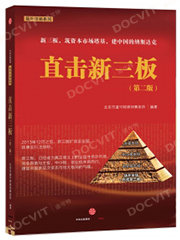
-
Deep Application of Limited Partnership in PE of China
-
Legal Perspective of M&A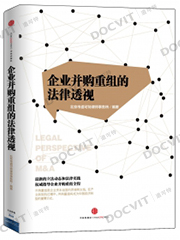
-
GLGA 1st Forum on Financial & Capital Market Development and Legal Regulation
-
1st Forum on Development and Innovation of Chinese Law Firms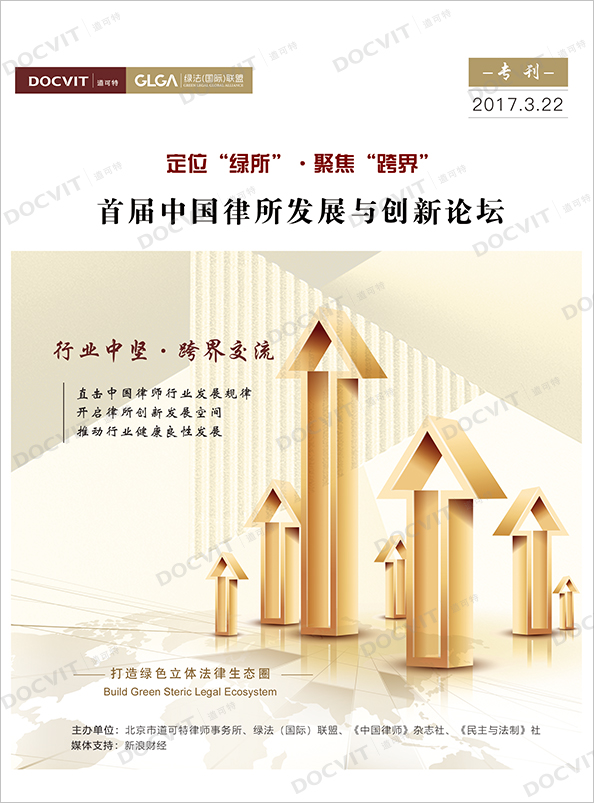
-
2nd Forum on New Driving Forces for China’s Economic Development and Legal Regulation and Release Conference of Legal Health Index of National Insurance Industry and Listed Companies of Central Enterprises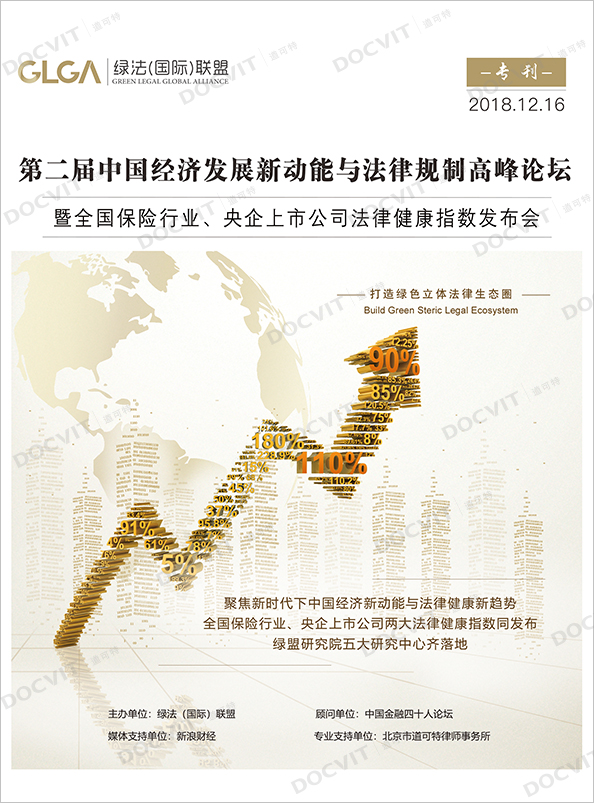
-
Release Conference of Blue Book of Legal Health of China’s Insurance Industry 2018 (Index & Special Reports)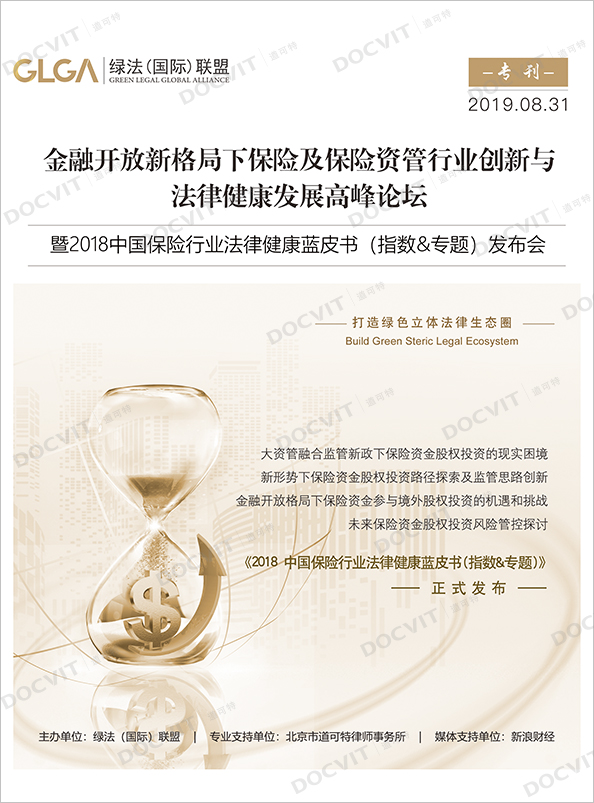
Three-year Strategy
More-
【Branch Strategy】
Docvit's branch strategy adheres to the corporate collectivized system, emphasizes the separation of the headquarters and Beijing Office, promotes multi-center concept, committing to building a true lawyer development platform for lawyers in the sense of the country and the world. -
【Business Partner Strategy】
Business partners are the core kinetic energy in Docvit's future development. We advocate the team system business for partners and set up the Operation Department, the Business Department or the Division, to form a development cooperation mode focusing on both people and the profession. -
【Future Partner Strategy】
We have developed a comprehensive talent selection strategy, talent development strategy and talent promotion strategy for young lawyers, established five major paths, i.e. setting up special funds, playing roles in front, setting up green ladders, promoting teams led by masters and external learning exchanges, and adopted relevant supporting incentives, etc., to train future partners.
Fellow Program
More-
【Fellow Program I】
With the launch of the "Fellow Program", Docvit hopes to unite with the like-minded lawyers of the country to build a career platform and realize their career dreams together. "Fellow Program I" aims to recruit partners, business partners and executive directors for the Docvit Branch in China. -
【Fellow Program II】
"Fellow Program II" aims to recruit partners and lawyers for Docvit Headquarters and Beijing Office across the country and around the world to become what the industry, Docvit itself, market and clients want. -
【Fellow Program III】
"Fellow Program III" aims to recruit partners for national branches of Docvit nationwide and globally. Docvit's national and global development blueprints require more partners to draw together, and let us work together to create a respectable law firm.

